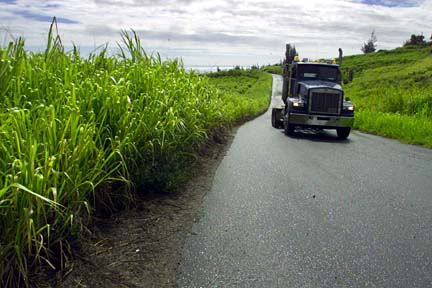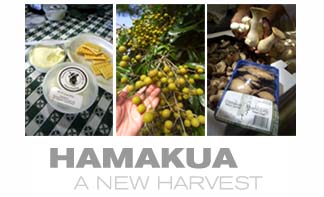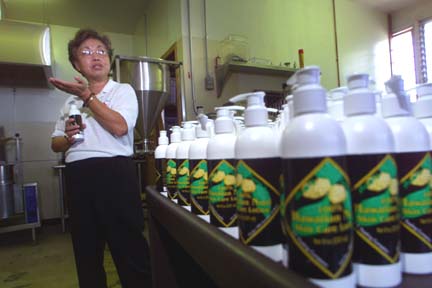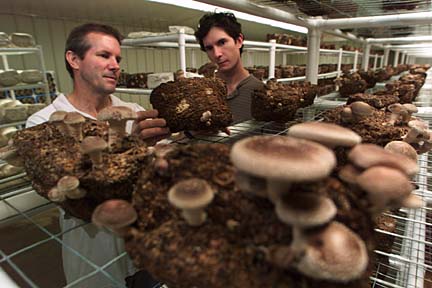
DEAN SENSUI / DSENSUI@STARBULLETIN.COM
Gert Rosenboom and his wife, Mery, are the newest additions to the growing number of Hamakua coast farmers, having arrived less than a month ago to take over Manelo Exotic Fruit Orchard and Nursery at Hakalau. Like many others who took up farming in the area, they are learning on the job about the exotic fruits such as rambutan, longan, lychee and mangosteen that they will raise and sell. The property will also serve as a showcase for others interested in buying property and starting an orchard.
Growing a new kind
of Hawaii farmer
October marks a decade since Hamakua Sugar shut down in 1993 after filing for Chapter 11 bankruptcy.
CORRECTION
Tuesday, Sept. 26, 2003>> KTA Super Store's late chief executive officer was incorrectly identified as Barry Taniguchi in a story on Page E6 Sunday. Barry Taniguchi is the company's current president. The story should have referred to Tony Taniguchi, Barry's uncle and former CEO, who died in 1989 at age 59.
The Honolulu Star-Bulletin strives to make its news report fair and accurate. If you have a question or comment about news coverage, call Editor Frank Bridgewater at 529-4791 or email him at fbridgewater@starbulletin.com.At the time of its demise, the 116-year-old company owned 35,000 acres and two sugar mills.
Despite the efforts of its last owner, Francis Morgan, Hamakua Sugar succumbed to changes in the world sugar market that claimed so many others in the industry and all but killed profitability for Hawaii sugar.
When the company closed, the future looked grim for hundreds of displaced sugar workers. After Hamakua Sugar bought in its final harvest, it left more than 400 families without work. And 10 years earlier it had employed more than twice as many people.
Yet the end of the plantation system also brought a chance for a new kind of agriculture, owned and run by individuals. While most agricultural businesses along the Hamakua coast are small ventures, some have achieved noteworthy success. Their successes and failures also illustrate that it takes as much business acumen as it does farming skill to run a successful agricultural enterprise.
One of the new breed of farmers in the area is Robert Stanga, president of Hamakua Heritage Farm in Laupahoehoe. He produces gourmet mushrooms. Like many of his counterparts, Stanga is relatively new to agriculture, although he grew up in California's Central Valley.
A helicopter pilot and former owner of Oahu-based Makani Helicopters, Stanga said his interest in mushrooms began with reading about them.
"I bought my first book on mushrooms 10 years ago and have been studying them ever since," he said.
Stanga bought the Laupahoehoe property in 2000 and now has a 16,000-square-foot facility where mushrooms are grown and packaged. With partner and company Vice President Josh Martinez, who has a degree in environmental science, the company is building an impressive customer list, adding Costco, Marukai, Daei, KTA and a number of gourmet restaurants in the past few months.
DEAN SENSUI / DSENSUI@STARBULLETIN.COM
At the Hawaii Island Goat Dairy, owners Dick and Heather Threlfall keep their herd of goats happy -- and producing plenty of milk for cheese -- in part by playing the radio for them, National Public Radio during the week and jazz on Sundays. The dairy routinely sells out of its cheese.
The pair's biggest help came from a former Waimea mushroom grower Malcolm Clark, who had successfully relocated his business to California. It was Clark who guided them to connections in Japan where they could obtain mushroom strains and processing equipment.
"The Japanese are light years ahead already," said Martinez.
Stanga and Martinez first brought the same strains of mushrooms from California to test the market before jumping in with both feet. All strains of the mushrooms are patented Japanese strains, including shiitake, white and brown shimeji and the giant king oyster mushroom, Martinez said.
In less than three months, the company will meet its current demand and all the mushrooms will be 100 percent Hawaiian grown. In the meantime, orders are supplemented with identical strains from California.
Within a year, when the farm reaches full capacity, it will likely have 10 to 15 employees, Stanga said. Currently there are three employees and two being added. The goal is to produce 5,000 to 6,000 pounds of mushrooms a week. Currently it's about 2,000 pounds, Stanga said.
One of the most experienced observers of the transition from plantations to the diversified agriculture is Derek Kurisu of the Big Island's KTA Super Stores. Kurisu, who was born and raised on a plantation, said KTA was one of the earliest supporters of local agricultural products beginning in the 1980s.
DEAN SENSUI / DSENSUI@STARBULLETIN.COM
Raising pigs is a seven-day-a-week, 24-hour-a-day job. Everyone in the McKeehan family participates in chores at the Ahualoa Hog Farm. The McKeehans raise free-range, or pasture, pigs. In most operations, pigs are raised in pens.
The company now has 80 different business partnerships related to local products, including dairy, meat, fruit and vegetables as well as sauces, flowers and herbs. Of those, 55 come from the Big Island and a number -- including Stanga and Martinez' mushrooms -- from the Hamakua coast, Kurisu said.
"We've been working with the farmers for a long time. In about 12 cases we helped owners get going, but a lot came and went," he said.
Kurisu said much of the company's interaction with local products began with the fall of sugar. He said KTA's late chief executive officer, Barry Taniguchi, told him that when the sugar industry finished, the company would need to help in some way.
"When Barry passed away several years later, everything was down and I knew I had to do something, so milk was the first item. We had a competitor who was going to bring milk in from the mainland. Farmers panicked, so I called a meeting and told the suppliers we would push freshness," he said.
DEAN SENSUI / DSENSUI@STARBULLETIN.COM
It will be 10 years in October since the close of Hamakua Sugar. Fields of fallow sugar cane still dot the Hamakua coastline, a reminder of the area's long plantation history.
Out of that decision, KTA developed its own Mountain Apple brand and KTA's line of local products continue to grow. Other stores have picked up KTA's lead and today most local supermarkets carry Hawaii-grown products.
Of Hamakua Sugar's original acreage, the company farmed about 21,400 acres. Kamehameha Schools bought much of the land in 1994. The rest of the land along the 45-mile stretch of the Hamakua coast belonged to a handful of large landowners, such as C. Brewer & Co. and the state. And about 4,000 acres went to Hawaii County to satisfy company debts.
While people like Stanga and Martinez initially funded their own ventures, many area farmers got their start with the help of a federal business grant and incubation program called Rural Economic Transition Assistance-Hawaii, or RETA-H,
Grants ranging from $50,000 to $200,00 helped many area residents begin all kinds of farm-related businesses -- some successful, some not.
Thirty-four RETA-H projects of 70 statewide stretched from North Hilo along the Hamakua coast. Occupying more than 13,000 acres, they created more than 300 jobs.
Of that number, about 61 percent of the jobs went to displaced sugar workers, according to Bob Chase, the man tapped to oversee the program, which concluded earlier this year.
About 25 percent of the RETA-H grantees failed, Chase said, but notes the number is low compared with failure rates for small businesses in general.
Reasons for the failures included unsuitable crops and bad weather, lack of business acumen, and failure to adapt to the market or seek new opportunities when others didn't pan out, he said.
About a third of the failures were due to changes in the market. A good example would be what happened with awa, or kava, farmers, Chase said. As awa was well on the way to becoming a major commercial crop, a worldwide scare about potential liver damage from awa put an immediate stop to a growing number of larger commercial enterprises that had sprung up locally. With the scare largely over, Chase said commercial quantities of awa are once again being planted and he anticipates it could once again become a major crop in the area.
But as KTA's Kurisu observes, a lot of farmers may know how to grow things, but not everyone knows how to market their products. Farmers need to recognize the needs of their customers.
For example, he said, they should notify the store before they are ready to harvest so it can advertise.
"They have to remember that they need to call so we can create an ad, which triggers demand," he said.
From the buyers' standpoint, consistency and reliability are key. But over time, Kurisu said, he has seen a big improvement.
"In the beginning we used to have to sample everything. Today there is a lot more science in growing," he said. "People don't just close their eyes and cross their fingers."
BACK TO TOP |
A story of diversity
New products from farms along
the Hamakua coast range from
the traditional to the experimental
Aunty Soon keeps moving after successSoon Burnham -- better known to the world as Aunty Soon for her hot sauce and kim chee sauce -- is a woman in a hurry.
After living in California for 20 years, she came to the little town of Honokaa on the Hamakua coast in 1993 looking for a slower pace of life.
But slow doesn't seem to be in her nature.
She launched her hot sauce business seven years ago.
Getting the right kind of peppers for her sauces was among her biggest challenges, said Burnham.
At first she tried Jalapeno peppers, but the flavor was not consistent and the peppers were either too wet or too dry. Finally, she managed to find farmers who were willing to grow Korean chili peppers.
Now sales are doing well.
"KTA sales alone pay the rent," she said.
DEAN SENSUI / DSENSUI@STARBULLETIN.COM
She's already created a successful business with hot sauces but Honokaa's Aunty Soon is moving on to do it again with noni juice and lotion.
But Burnham is not ready to rest. Her latest passion is noni, both the juice form drunk for its health benefits and as a lotion.
But like finding the right peppers and the people to grow them, finding the right people to produce the juice has been a challenge. With a couple of reliable growers, she believes she'll be able to get enough product to meet the demand for both noni lotion and juice within the year.
Communication is the key, she said.
"We have to have a lot of education among the producers. But once they know what I do and how I do it, then there's no limit, she said.
Soon is now ready to export her noni lotion to Japan where she has already established contacts.
"I'm just waiting for USFDA approval because it's cosmetic," she said.
Korea is her other overseas target market. She has already sent a small quantify of juice there and will follow with lotion.
Local mushrooms already catching onThere is a science as well as an art to creating a tasty mushroom. At their 16,000-square-foot facility, owners Bob Stanga and Josh Martinez put a mixture of compressed sawdust into sterilized plastic bottles. Shiitake mushrooms are grown in plastic bags containing a block of the mixture. Under the traditional method, shiitake were grown on oak logs.
The concoctions then move into sterile rooms to be seeded. Incubation periods depend on which type of mushroom is being grown. Shiitake and shimeji take 90 days to grow, oyster mushrooms, one month. The pair anticipate producing just under 7,000 bottles per week of various types of mushrooms, like oyster, and 500 blocks of the shiitake mushrooms.
Customers such as Costco are already selling the mushrooms. For example their "fungal jungle" pack contains three of the five species grown.
DEAN SENSUI / DSENSUI@STARBULLETIN.COM
Bob Stanga and Josh Martinez had to master a lot of new tasks to grow mushrooms. Among them is "spanking" the mushrooms to encourage them to begin reproducing.







